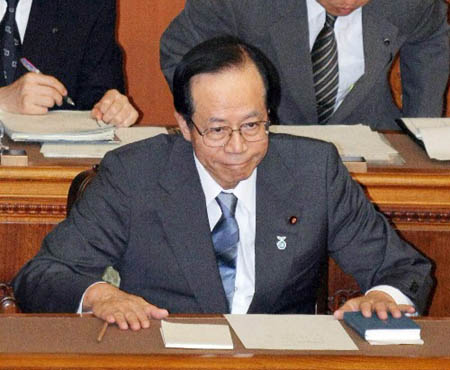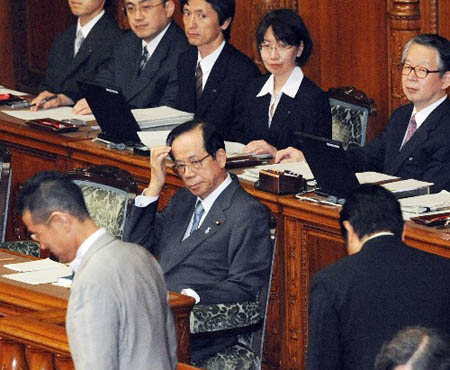
Japanese Prime Minister Yasuo Fukuda attends meeting of upper house on June 11, 2008. Japan's opposition-led upper house on Wednesday approved a nonbinding censure motion against Prime Minister Yasuo Fukuda. (Xinhua/AFP Photo)
Japan's opposition-led upper house on Wednesday approved a nonbinding censure motion against Prime Minister Yasuo Fukuda.
The House of Councilors voted by 131 to 105 to adopt the motion, which was tabled by the main opposition Democratic Party of Japan (DPJ), along with the Social Democratic Party and the People's New Party, to criticize Fukuda's policy on domestic issues such as the elderly healthcare insurance.

Japanese Prime Minister Yasuo Fukuda (C) attends meeting of upper house on June 11, 2008. Japan's opposition-led upper house on Wednesday approved a nonbinding censure motion against Prime Minister Yasuo Fukuda. (Xinhua/AFP Photo)
Fukuda has thus become the first Prime Minister to face a non-confidence motion in the upper house under the current 1947 Constitution.
The ruling bloc, however, has immediately introduced a confidence motion in Fukuda's Cabinet in the ruling-dominated House of Representatives to counter the censure motion. In a plenary session Thursday, the confidence motion is almost certain to be adopted in the ruling-led lower house.
As Fukuda has lost the support of the people, he should resign or dissolve the lower house for a general election, said the opposition parties.
Despite the adoption of censure motion, the Prime Minister said that he has no intention of dissolving the lower house for a general election.
The censure motion came after the government refused to approve a bill submitted by the opposition camp to annul a new healthcare insurance program for the elderly aged 75 and older. The opposition criticized the program for putting a heavier financial burden on the elderly with low incomes.
Under the Constitution, a censure motion adopted by the upper house has no legally binding force while a non-confidence motion that passes the more powerful lower house will lead to the resignation of the Cabinet or dissolution of the lower house.
(Xinhua News Agency June 12, 2008)